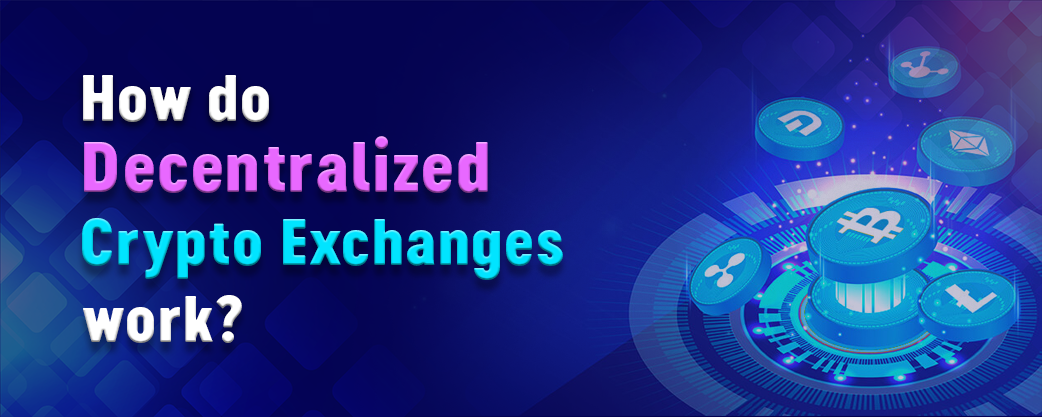
How do Decentralized Crypto Exchanges work?
With the development in the high-tech industries and blockchain
technology booming stage, decentralized concepts are also becoming popular and
of course, demanding one.
In the crypto-verse and blockchain space, decentralized
cryptocurrency trading exchanges are becoming one of the hot topics these days.
Even the experts are concluding their valuable thoughts on fintech and
businesses by appending Decentralized features.
Before initiating the decentralized crypto exchanges and their use case in the crypto market, let’s understand the basic meaning of centralized and decentralized concepts.
Centralized vs Decentralized Concept
The centralized theory is run on the central or mediator server
whereas, the decentralized concept doesn’t include any central server for the
proceedings. Whereas in the centralized method, objective settings, strategies
implementation, funding, and others are carried forward by a monitoring authority
or centralized businesses. In contrast, a decentralized method flows directly
from one party to another without anyone’s involvement in between.
So, that is how the centralized and decentralized cryptocurrency exchanges work. Now let’s begin with the concept of Decentralized crypto exchange and how it works.
Decentralized Crypto Exchange
A decentralized exchange (DEX) is a type of cryptocurrency exchange that operates on a blockchain network. Here, direct peer-to-peer trading of cryptocurrencies takes place, without the need for a central authority or intermediary. This decentralized nature of DEXs is what sets them apart from centralized exchanges, which rely on a central server to validate and execute trades. Some of the cryptocurrency exchanges which provide decentralized trading services in the market are PancakeSwap, Kyber, dYdX, and Uniswap.
How do the Decentralized Exchanges (DEXs) work?
One of the key features of DEXs is that they allow users to hold their own private keys and assets. This means that users have full control over their funds and no third party can freeze or seize them. These features of DEXs enhance the security and privacy of the user's funds and trading activities.
Decentralized exchanges are typically implemented using smart contracts on a blockchain network, such as Ethereum. Smart contracts are self-executing contracts with the terms of the agreement between buyer and seller being directly written into lines of code. They allow for the automatic execution of trades based on predefined rules and regulations.
All the aforementioned dynamic attributes of DEXs help the crypto fanatics experience instantaneous trades frequently with less transaction fees than on centralized cryptocurrency exchanges.
Types of Decentralized Exchanges (DEXs)
There are mainly three types of decentralized exchanges; Automated Market Maker (AMM), Order Books DEXs, and DEX Aggregators. All of these Decentralized Exchanges allow the users to buy, sell, and trade directly with the advancement of smart contracts.
Let’s look at all three decentralized exchanges and how they work.
Automated Market Maker
(AMM)-
One popular way DEXs are implemented is through the use of an Automated Market Maker (AMM) algorithm. These algorithms use a mathematical formula to set the price of assets and can adjust prices based on supply and demand. The AMM algorithm ensures that the prices of assets are fair and reflective of their true value. Examples of such DEXs are Uniswap, Balancer, or Sushiswap.
Order Book DEXs-
Another way DEXs are implemented is by using an order book, it is more or less similar to centralized exchanges. In this case, users submit their buy and sell orders to the order book, and trades are executed when a matching order is found. This allows for a more traditional trading experience, similar to centralized exchanges. Examples of this type of DEXs are 0x, Kyber, or Airswap.
DEX Aggregators-
Decentralized exchanges (DEX) employ a variety of protocols and
techniques. Higher security and autonomy are the results of this dynamic, but
it also leads to inconsistent platform-to-platform liquidity. This lack of
liquidity can be a deterrent for institutional investors or wealthy independent
traders who want to purchase a select crypto asset in large volumes. To address
this, DEX aggregators have developed tools to deepen asset liquidity pools
across centralized and decentralized crypto exchanges.
Examples of this type of 1inch exchange and DiversiFi.
Advantages of Decentralized Exchanges
DEXs have several advantages over centralized exchanges. As mentioned earlier, since users hold their own private keys and assets, there is less risk of hacks or breaches resulting in the loss of funds. Additionally, DEXs offer increased security, privacy, and decentralization, since there is no central point of failure. It also allows for more freedom and fewer regulations as they are not bound by the regulations of a central authority. However, there are also some limitations and challenges associated with DEXs. One of the major challenges is low trading volumes and liquidity compared to centralized exchanges, which can make it harder to execute trades and make a profit.
In summary, decentralized exchanges offer a new and innovative way of trading cryptocurrencies, with added security and privacy benefits. They operate on a blockchain network, using smart contracts for the automatic execution of trades. DEXs can be implemented using an automated market maker algorithm or an order book, and offer a wide range of advantages over centralized exchanges. However, they also have their own limitations and challenges, and it is important to be aware of these before deciding to trade on decentralized exchanges (DEXs).












